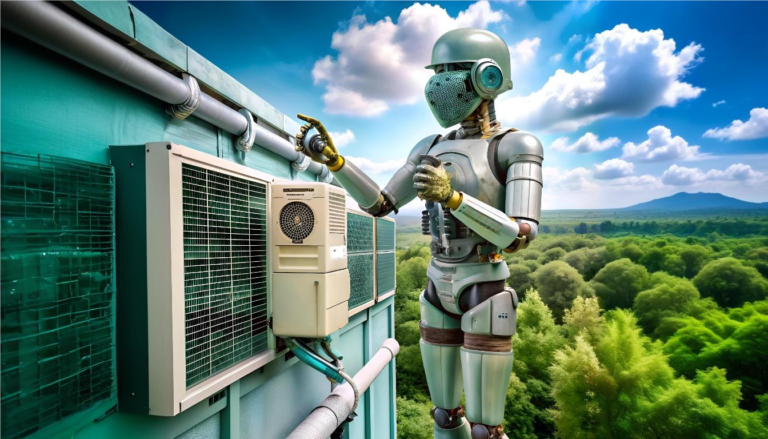Top Digital Marketing Trends to…
The Impact of Virtual Events on Digital Marketing Strategies in…

Did you know that buildings are responsible for approximately 40% of global energy consumption, with HVAC systems accounting for a significant portion? This staggering statistic speaks volumes about the inefficiencies in the way we heat, cool, and ventilate our indoor spaces today.
But what if there was a way to drastically cut down energy consumption, enhance comfort levels, and ensure seamless maintenance of HVAC systems? Enter artificial intelligence (AI), a game-changer poised to transform the HVAC industry forever.
This blog explores how AI is addressing long-standing challenges in HVAC, driving unprecedented efficiency, comfort, and sustainability. By the end, you’ll understand why HVAC professionals and sustainability enthusiasts alike are excited about this promising technology.
HVAC systems play a pivotal role in providing comfortable indoor environments, but they’ve long been plagued by inefficiencies and complexities. Common challenges include:
HVAC systems often fail to adapt dynamically to changing conditions, leading to wasted energy and higher operational costs.
Manual temperature settings rarely account for individual preferences or fluctuating external factors like humidity.
Traditional maintenance often adheres to rigid schedules rather than addressing actual wear and tear, resulting in unnecessary repairs or, conversely, unexpected breakdowns.
To combat these issues, conventional HVAC systems have relied on methods like:
While effective for small-scale systems, manual interventions are time-consuming and far from ideal for energy optimization.
While scheduled maintenance prevents some breakdowns, it doesn’t account for unforeseen malfunctions and often wastes resources.
Artificial Intelligence (AI) refers to computer systems capable of performing tasks that typically require human intelligence, like decision-making, learning, or problem-solving. Machine Learning (ML), a subset of AI, uses algorithms to analyze data, identify patterns, and continually improve its performance without human intervention.
When applied to HVAC, AI harnesses real-time data to autonomously optimize operations, diagnose faults, and even predict future system behaviors.
AI is revolutionizing the HVAC industry on several fronts, paving the way for a new era of smart climate control.
AI analyzes performance data to predict potential equipment failures before they occur. Instead of waiting for your HVAC system to break down, you receive alerts to schedule maintenance proactively.
AI-driven software continuously adjusts HVAC systems based on real-time data, such as occupancy levels, external weather conditions, and energy costs. This results in reduced energy consumption and significant savings.
Forget a “one-size-fits-all” approach. AI leverages sensors and historical preferences to offer individually tailored climate control solutions.
AI algorithms can identify issues faster and more accurately than human technicians, often providing precise diagnoses and actionable solutions.
AI-powered systems often come with remote monitoring capabilities, allowing users to adjust settings, monitor performance, and receive alerts—all via a smartphone or dashboard.
Example: Adjust your home’s air conditioning on the way back from work, ensuring a perfectly cooled living room upon arrival.
The HVAC industry shows no signs of slowing down when it comes to AI innovation. Key trends include:
AI systems are integrating seamlessly with smart home ecosystems, offering a unified control interface for everything from lighting to HVAC.
2. AI-Powered HVAC Design and Installation
AI algorithms are starting to optimize HVAC designs tailored to specific building layouts and energy needs.
3. Advanced Analytics
Expect deeper insights into energy usage patterns and maintenance predictions, giving businesses and homeowners greater control.
The adoption of AI in HVAC promises widespread advantages, including but not limited to:
AI reduces energy waste by optimizing system performance intelligently.
Personalized climate settings lead to better workspace productivity and improved living conditions.
Proactive maintenance ensures fewer breakdowns and reduces lifetime system costs.
By curbing energy consumption, AI can drastically lower the carbon footprint of buildings.
The intersection of AI and sustainability technology has opened up limitless possibilities for an industry as critical as HVAC. Whether you’re a professional seeking operational improvements or a sustainability enthusiast striving for greener solutions, AI-powered HVAC systems offer a path forward into a smarter, more efficient future.
If you’re not yet utilizing AI in your HVAC ventures, now’s the perfect time to explore its potential. Modern AI-powered HVAC solutions are already delivering remarkable value through energy savings, comfort enhancements, and reduced maintenance costs, making them a must-have for any forward-thinking organization or individual.
Want to learn more about cutting-edge AI systems for HVAC efficiency? Consider exploring the latest innovations tailored to your needs—because the future of HVAC is here, and it’s powered by AI.
Also Read :- Why LinkedIn Articles are a Goldmine for Your HVAC Business
The Impact of Virtual Events on Digital Marketing Strategies in…